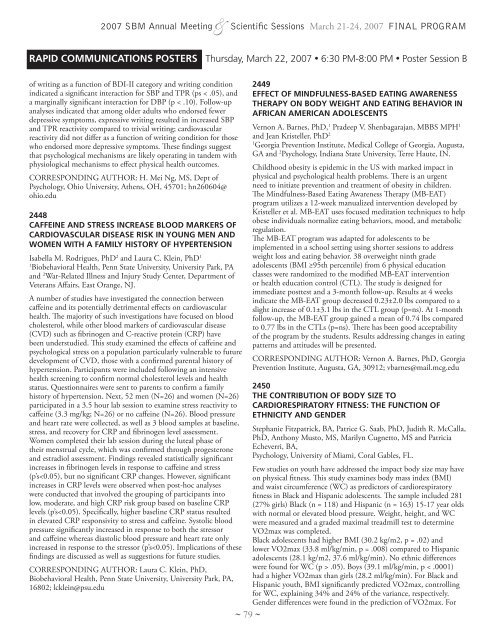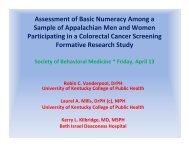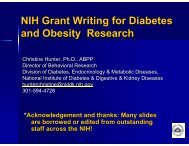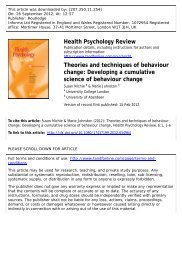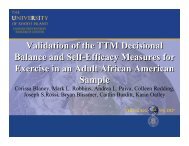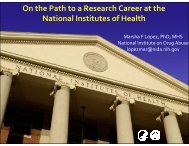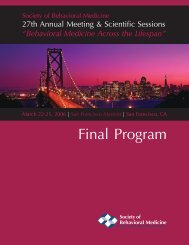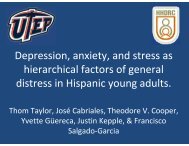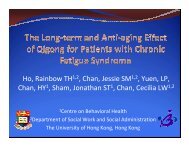2007 Final Program - Society of Behavioral Medicine
2007 Final Program - Society of Behavioral Medicine
2007 Final Program - Society of Behavioral Medicine
You also want an ePaper? Increase the reach of your titles
YUMPU automatically turns print PDFs into web optimized ePapers that Google loves.
<strong>2007</strong> SBM Annual Meeting & Scientific Sessions March 21-24, <strong>2007</strong> FINAL PROGRAM<br />
Rapid Communications Posters Thursday, March 22, <strong>2007</strong> • 6:30 PM-8:00 PM • Poster Session B<br />
<strong>of</strong> writing as a function <strong>of</strong> BDI-II category and writing condition<br />
indicated a significant interaction for SBP and TPR (ps < .05), and<br />
a marginally significant interaction for DBP (p < .10). Follow-up<br />
analyses indicated that among older adults who endorsed fewer<br />
depressive symptoms, expressive writing resulted in increased SBP<br />
and TPR reactivity compared to trivial writing; cardiovascular<br />
reactivity did not differ as a function <strong>of</strong> writing condition for those<br />
who endorsed more depressive symptoms. These findings suggest<br />
that psychological mechanisms are likely operating in tandem with<br />
physiological mechanisms to effect physical health outcomes.<br />
CORRESPONDING AUTHOR: H. Mei Ng, MS, Dept <strong>of</strong><br />
Psychology, Ohio University, Athens, OH, 45701; hn260604@<br />
ohio.edu<br />
2448<br />
CAFFEINE AND STRESS INCREASE BLOOD MARKERS OF<br />
CARDIOVASCULAR DISEASE RISK IN YOUNG MEN AND<br />
WOMEN WITH A FAMILY HISTORY OF HYPERTENSION<br />
Isabella M. Rodrigues, PhD 2 and Laura C. Klein, PhD 1<br />
1<br />
Biobehavioral Health, Penn State University, University Park, PA<br />
and 2 War-Related Illness and Injury Study Center, Department <strong>of</strong><br />
Veterans Affairs, East Orange, NJ.<br />
A number <strong>of</strong> studies have investigated the connection between<br />
caffeine and its potentially detrimental effects on cardiovascular<br />
health. The majority <strong>of</strong> such investigations have focused on blood<br />
cholesterol, while other blood markers <strong>of</strong> cardiovascular disease<br />
(CVD) such as fibrinogen and C-reactive protein (CRP) have<br />
been understudied. This study examined the effects <strong>of</strong> caffeine and<br />
psychological stress on a population particularly vulnerable to future<br />
development <strong>of</strong> CVD, those with a confirmed parental history <strong>of</strong><br />
hypertension. Participants were included following an intensive<br />
health screening to confirm normal cholesterol levels and health<br />
status. Questionnaires were sent to parents to confirm a family<br />
history <strong>of</strong> hypertension. Next, 52 men (N=26) and women (N=26)<br />
participated in a 3.5 hour lab session to examine stress reactivity to<br />
caffeine (3.3 mg/kg; N=26) or no caffeine (N=26). Blood pressure<br />
and heart rate were collected, as well as 3 blood samples at baseline,<br />
stress, and recovery for CRP and fibrinogen level assessment.<br />
Women completed their lab session during the luteal phase <strong>of</strong><br />
their menstrual cycle, which was confirmed through progesterone<br />
and estradiol assessment. Findings revealed statistically significant<br />
increases in fibrinogen levels in response to caffeine and stress<br />
(p’s


